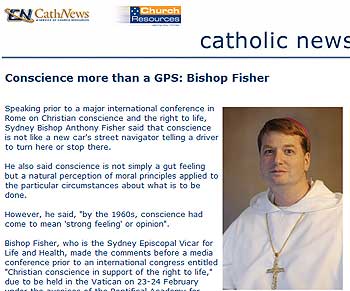 On Saturday last, March 3rd in Rome, Bishop Anthony Fisher, an Auxiliary Bishop of the Catholic Archdiocese of Sydney presented a paper on conscience that is being circulated widely. Because of the relevance of the topic for all people of good will, and lest the venue along with the flourishes of learning within which the address is couched might lead some to presume the presence of great wisdom I, a simple priest, dare to add a dissonant voice. My intention is not to contradict Bishop Anthony but to claim that the issue is worthy of a much wider and more nuanced treatment than he has given. What he has to say is far from the last word, and far from the best words, on this all important topic.
On Saturday last, March 3rd in Rome, Bishop Anthony Fisher, an Auxiliary Bishop of the Catholic Archdiocese of Sydney presented a paper on conscience that is being circulated widely. Because of the relevance of the topic for all people of good will, and lest the venue along with the flourishes of learning within which the address is couched might lead some to presume the presence of great wisdom I, a simple priest, dare to add a dissonant voice. My intention is not to contradict Bishop Anthony but to claim that the issue is worthy of a much wider and more nuanced treatment than he has given. What he has to say is far from the last word, and far from the best words, on this all important topic.
He decries the late scholastic position that likens conscience to the navigating device he has in his car which connects him to some external satellite navigator which is to be listened to and obeyed. After many studious readings I find it hard to see how his vision of conscience differs significantly from that position.
I am not happy with the cavalier way he seems to oppose the world to God with statements such as “if in our sinful world God’s law seems unrealistic, the trouble is not with God’s law but with the world”. This is especially noxious when he describes those who provide problems for his position as zeitgeists and implies a rather naïve identification between the Magisterium and God’s law. What on earth is he trying to say when he writes “the Magisterium informs conscience from within”?
The disturbing dichotomy he places between Church and world is nowhere more present than in the way he fails to evidence any real appreciation of the post-Freudian insights into the human person and condition. It is hard to escape the impression that for him the human personal subject is inferior to some nebulous objective reality.
I also see him implicitly treating the relationships between affectivity and rationality and the masculine and feminine in a dichotomous, even a patriarchal way. With a few superficial nods here and there towards modernity put aside, the essence of what Fisher has to offer could have been written in the thirteenth century.
I’m sure that Bishop Fisher would not want to be excluded from the ongoing challenge provided for all of us who dare to teach by his statement that misconceptions about conscience are commonplace and lead to many disastrous decisions.
Fr John Ryan lives in Canberra. He has spent most of his 44 years of ministry in the Catholic Church working in renewal projects, especially with priests. This article has its basis in a book he is completing for publication.